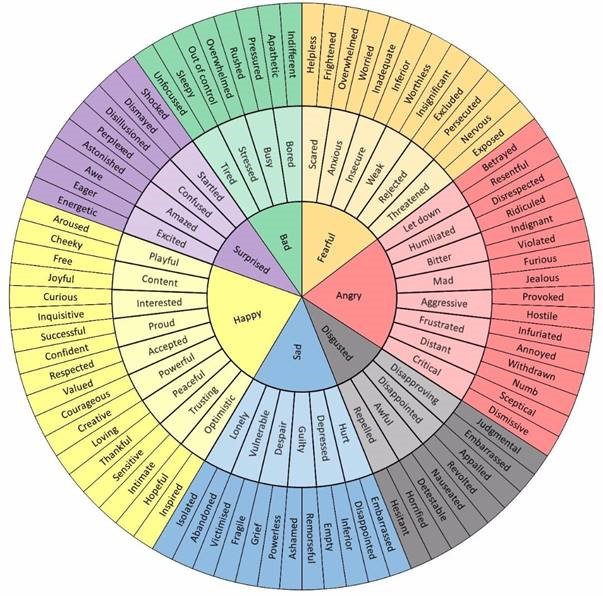All children have occasional temper tantrums and outbursts. Because they don’t have the internal infrastructure to deal with big emotions, they get frustrated and angry. Other emotions—sadness, irritability, shame, guilt or embarrassment—usually lie at the root of a child’s anger.
Dealing with a child experiencing anger issues is never easy, but it is possible for parents to help them learn to manage these feelings in healthy ways. Consider the following approaches.
1) Use the Emotional Wheel
The Emotional Wheel (also now referred to as the "Feelings Wheel" or "Wheel of Emotions"), was first developed by American psychologist Dr. Robert Plutchik in 1980. It is a useful tool for helping kids identify their feelings. I often refer children to the adaptation of the Emotional Wheel (image below) during therapy—and so can you at home. With your child, start in the middle and work your way. This exercise helps them (and parents), recognize the emotions beneath their anger so we can address the real issues.

You can find several versions of this wheel online or create your own. This Interactive Feelings Wheel offers an engaging online tool to uncover and understand deeper feelings together. Pinterest is a also great place to find downloadable examples or inspiration.
2) Stay Calm, Listen & Validate
As hard as it is to keep our own emotions in check when our children are angry, mirroring their anger with our own exacerbates an already difficult situation. Remaining calm when your child is upset sends the message that their emotions are not “wrong.”
Acknowledge and validate your child’s emotions. Our instinctual response is often to stop any emotion that causes distress. We say things to kids like, “Don’t be angry” and “Act your age.”
This sends the message that emotions are not okay. When kids buy into this belief they try to control their emotions and worry they are letting you down. Listening, validating, and helping them regulate their emotions and behaviors sends a much healthier message of support and understanding.
3) Let Your Child Express Their Emotions (Without Trying to Reason with Them)
Give children permission to express their emotions as they arise to build their emotional intelligence. Don’t try to reason with your angry child. Rationalizing with an angry person, let alone an angry child, is not likely to be very successful. When we are in an emotional state, our rational brains have a difficult time kicking in. Trying to get kids to understand their actions are irrational is likely to make the situation worse.
4) Offer a Coping Strategy (One at a Time)
Instead of pointing out why your child “shouldn’t” be upset, offer coping strategies or distractions, calmly and one at a time.
For instance, say,
“I see you’re upset. Would you like to ___________?”
Keep your suggestions simple and straightforward. Offering more than one option may overwhelm your child. If you can’t calm your child, be present. Sometimes you won’t be able to calm your child, and all you can do is support and validate them through their anger.
5) Step Away if Needed
If you need a break, it’s okay to step away if you let your child know where you’re going.
Say something like,
“I can see that you’re still really angry, and I want to give you some space. I’ll be on the couch until you’re ready to talk to me.”
This validates their emotions and sends the message that you are there for them but respect their need for space. When you are ready to re-engage, go back and sit with them through their big emotions.
6) Follow Up
When everyone is in a better emotional space, sit down with your child to discuss ways to handle these situations moving forward.
What worked? What could you have done differently?
Ask your child what they need from you when they are angry.
If you lost your temper, which is only too human in these situations, acknowledge what you could have done differently and apologize.
Consider saying,
“I know I lost my temper, too, and I’m sorry about that.”
Apologizing is a powerful message that teaches accountability.
Following these approaches can help create a healthy environment for children and parents. If you need more support, don’t hesitate to reach out to your child’s school counselor or a local counseling agency for assistance. We've also created a mental health resources library with additional topics and tools for parents. Dealing with anger, developing coping strategies, and learning to safely express emotions is a process that takes time and patience. It's not always easy, but it is possible.


